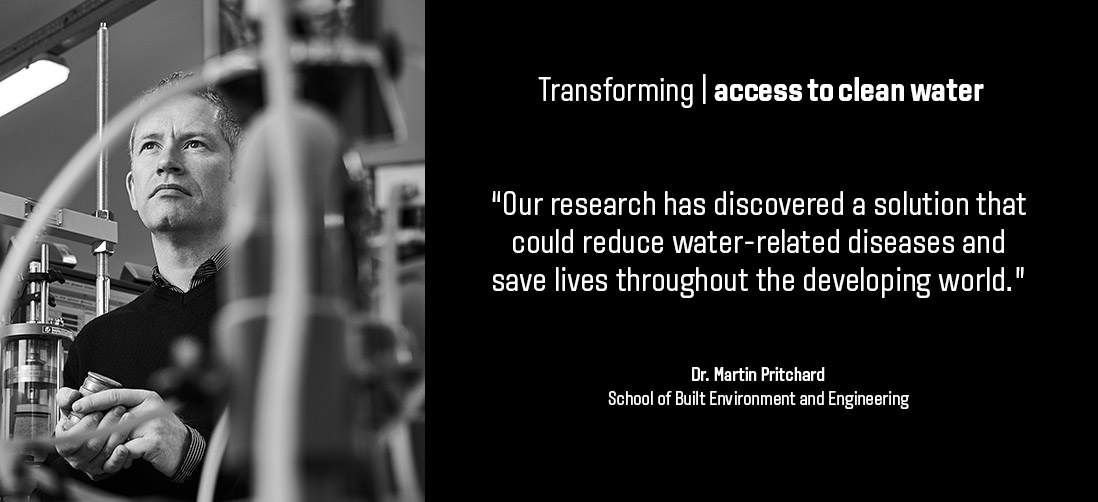Dr. Martin Pritchard at Leeds Beckett is a Reader in Civil Engineering in the School of the Built Environment & Engineering, and has been developing research on portable water supplies for developing countries. Find out more below.
In developed countries potable water is usually taken for granted, where advanced infrastructure and a strong economy has allowed waterborne diseases such as cholera and dysentery to be virtually eradicated. In contrast, developing countries have poor infrastructure and lack development, stability and vibrancy. Non-governmental organisations (NGOs) construct shallow wells to try to meet current targets; however, they do not implement monitoring programmes to ensure that the water remains potable. The preconception is that because these people have an engineered well, they have an adequate drinking water source. However, this is often far from the case, consuming untreated and potentially contaminated groundwater extracted from shallow wells is often the only option. Water-related diseases are responsible for 80% of all illnesses in developing countries and kill more than 3.5 million people every year. Statistically, this is greater than that of malaria and HIV/AIDS combined.
To help address this issue as a Civil Engineer over the past 15 years, I have led (as Principal Investigator) teams of international researchers to undertake complementary multidisciplinary research and development work to evaluate, improve and develop the water quality infrastructure and operational reliability of rural community water points throughout developing countries. Initially, my work was focused in sub-Saharan Africa, principally Malawi but also included Botswana, Ghana and Uganda.
Originally my work was directed towards meeting the Millennium Development Goals (MDGs), namely Target 7(c), which was aimed at halving the number of people without access to water and sanitation by 2015. To initiate this work, I directed an extensive field-monitoring programme throughout southern Malawi, which documented the drinking water quality of 17,000 rural Malawians. This study was funded by the Water Research Fund for Southern Africa (WARFSA) and WaterNet. About 95% of all the wells tested failed to meet safe drinking water values for untreated water. To immediately minimise water related diseases, I worked directly with NGOs, water officers, community leaders and village chiefs to develop remediate solutions to address the wells which were yielding grossly biologically contaminated water. However, to make a real impact I realised that I needed to address this issue at a higher level. I therefore lobbied MPs to influence policy makers. I disseminated my field data in 16 international learned publications (i.e. five journals, two book chapters and nine conferences). Inter alia, the ‘Water Resources Investment Strategy’, World Bank funded, captured my data to develop new policy.
My work has now progressed towards addressing the 2030 Sustainable Development Goals (SDGs), namely Goal 6 where water quantity and quality are inextricably linked. Currently, my work involves the design, develop and implement of a novel small-scale community-based water treatment system, using locally available materials that are very low cost and sustainable. However, the development of the system has involved using advanced computational fluid dynamics (CFD) packages, together with undertaking extensive cytotoxicity tests on the purified water to ensure it is safe for human consumption.
In-situ testing of my water treatment system has recently commenced in Lunzu Township, Blantyre, Malawi. Initial field data demonstrates that improvement in groundwater quality of around 80% can be achieved. Thus, if implemented for every shallow well in Malawi around 1.5 million Malawians could have significantly improved water sources. Anecdotally, even the medical profession acknowledges the fact that the development of advanced water purification and sanitation systems are more important than modern medicine in saving lives (reference to the outcome of the 2007 British Medical Journal vote). Interest in applying the technology on a larger-scale has been expressed by a number of NGOs and the private sector.
The contribution of my efforts to society has been acknowledge by receiving various awards – the most prominent being first prize at the Research Councils UK Water Research Impact Awards 2015. This is in respect to my research and development work on ‘reducing waterborne diseases from shallow wells in the developing world’. More recently, I have received awards for addressing ‘social’ and ‘developing’ needs. These acknowledge my research work undertaken towards developing technological, sustainable, and yet appropriate solutions to tackle civil engineering issues within developing countries.

FUTURE PLANS
Too many horrific statistics exists to demonstrate that developing countries lag so far behind developed countries in respect to providing the basic human need for potable water; potentially, this is one of the greatest development failures of the 20th century. The research work detailed above together with the resulting impact could have a significant contribution towards counteracting such horrific statistics related to waterborne diseases from rural water points.
My overarching vision is the formation of a central Research Hub, fed and managed by complementary subject specific sub/regional hubs from different developing partnering country. The regional hubs will work together to host a range of work packages (WPs) to develop, trial and implement appropriate water treatment technologies and remote monitoring systems throughout the developing world. It is the integration of outcomes from each WP that offers a unique overarching solution to tackle intractable water quality issues for the developing world. The main themes of the WPs are listed below:
- WP1: Scientific investigation of more appropriate and sustainable materials.
- WP2: Development of innovative community-based water purification systems.
- WP3: Low cost remote telemetry monitoring device.
- WP4: Big data set water quality model.
- WP5: Educational programmes.
- WP6: Maintenance programme and alert warning system.
- WP7: Management, integration and large-scale implementation of the above systems.




